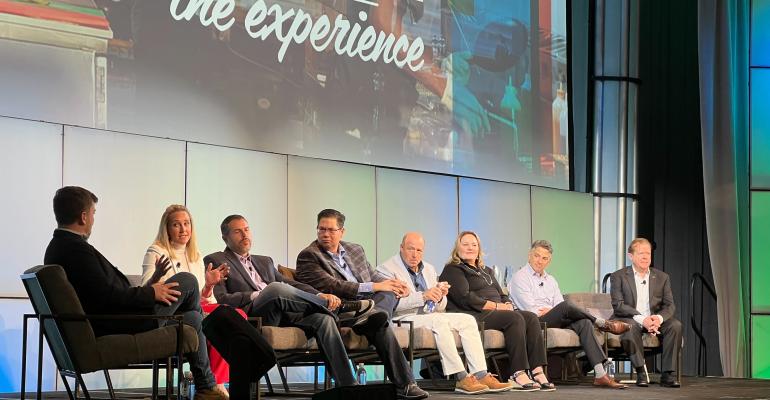Whether you’re a company as large as Dine Brands, or an emerging brand like Denver-based Bonanno Concepts, the key to successful restaurant industry growth is putting people first by listening to your customers’ changing needs. This was a major theme of Tuesday’s panel with Informa’s CREATORS awards winners at the CREATE conference in Denver, as representatives from the winning brands — Wendy’s, Capriotti’s/Wing Zone, Ascend Hospitality, Smokey Bones, Bonanno Concepts, and Dine Brands — discussed taking calculated risks for big payoffs.
Before the pandemic, Florida-based barbecue chain Smokey Bones would never have classified itself as a takeout restaurant, but as customer needs have changed in the past couple of years, the company has been open to going with the flow.
“A few years ago, I personally would have laughed at you if on a Wednesday night you asked me for one of our housemade pastas to-go,” James O’Reilly, CEO of Smokey Bones said Tuesday. “But we tried it at one of our stores during the pandemic and it singlehandedly turned the store around […] that restaurant has turned into one of our top three restaurants, and the chef that had the idea for takeout is now our director of operations two years later.”
The moral of the story? Don’t be resistant to change, especially during a time of industry-wide upheaval and listen to what your people want. Capriotti’s and Wing Zone CEO Ashley Morris felt similarly about embracing third-party delivery in 2020, though initially he wanted to be patient and wait it out. But Morris’ team encouraged him to fully embrace third-party delivery as the future of the hospitality experience and he is grateful for that push:
“Thanks to the cell phone, the do-it-yourself consumer is going to continue becoming this newer generation of people who […] don’t necessarily need as much service as historically has been seen in hospitality,” Morris said. “You’ve got to do new things whether you like them or not because the writing is on the wall, and if you don’t embrace the change, you’re going to be playing catchup.”
One of the hottest (and most divisive) new tech toys that restaurant industry leaders either love or hate is the metaverse. But while some brands have shied away from virtual interactivity, Wendy’s has completely embraced it, and has become a leader in the Web3 marketing space. Wendy’s vice president of national marketing Lindsay Radkoski said on Tuesday that their venture into the Wendyverse was a “calculated risk” that they plan to make a long-term play out of.
“For us the big internal discussion going on was, ‘we're not going to do it just to check a box and get a headline,’” she said. “We're going to do it to engage with our customers over a long period of time.”
That virtual engagement of being able to play basketball with the Baconator in virtual reality will naturally translate into customer actions in the world, including increased digital sales.
This — our panelists agreed — is what digital hospitality looks like in the modern era: listening to customers both in the digital world and in the “real world” and translating that to stronger consumer relationships. At Dine Brands, CEO John Peyton said, they accomplished this through customer segmentation on social media and embracing what they call the “spirit of entrepreneurialism.”
“We all knew that we wanted to get more guests to come and try us but but we needed to meet them where they were,” Peyton said. “Now we have segmentation that allows us to target individuals based on what they what decisions they make when they're hungry and where they get information from. So, for example, you know, if someone is more focused on quality of ingredients, we might use Instagram to reach them, but if someone is interested in our viral menu items then TikTok is a great place.”
The big takeaways from this year’s CREATORS honorees? Listen to your customers, don’t be resistant to change, and get comfortable with taking risks, whether it’s an interaction at a restaurant or on a screen:
“What can we do in that 60 to 90 minutes of customers dining in our restaurants that will lead them to want to tell others about their experience?” Jeffrey Fredrick president and partner of Ascend Hospitality said. “[…] So that they feel compelled to take out their phones and capture that moment and share it? They’re really being our ambassadors to the consumer, and that begins and ends with the experience in our four walls.”




